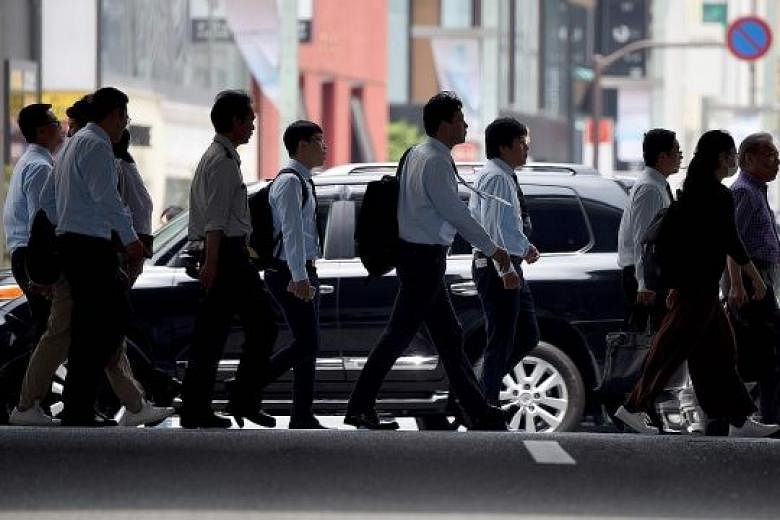TOKYO • Japanese Prime Minister Shinzo Abe yesterday ordered his top advisory panel to consider ways to increase the pool of foreign workers to deal with the country's chronic labour shortages.
Mr Abe also asked Cabinet ministers to consider ways to limit fluctuations in consumer spending when the government raises the nationwide sales tax in 2019.
His comments are a sign of the new policies he will try to prioritise this year to ensure that a recent run of solid growth remains on track.
"I want to be able to show some direction on accepting foreign workers by the summer," Mr Abe said at a meeting of the Council of Economic and Fiscal Policy.
The government will examine visa requirements and regulations for both high-skilled and low-skilled foreign labour, a government official said at a briefing.
However, the government is particularly concerned about an increase in exchange students and part-time trainees who are working illegally in low-skilled jobs in retail, construction and agriculture, the official said.
The number of illegal workers in these industries has been growing rapidly recently, signalling that the government needs to do something to meet growing demand for workers, the official said.
Japan has one of the world's most rapidly shrinking and ageing population due to a declining birth rate and improved life expectancy.
Labour shortages have become so pronounced that companies in retail and other services have started to shorten operating hours or scale back business operations.
The government is scheduled to raise the nationwide sales tax to 10 per cent from 8 per cent in 2019. The last time the sales tax was hiked in 2014, it caused big fluctuations in consumer spending and a temporary contraction in the gross domestic product (GDP).
Meanwhile, more than half of Japan's companies do not plan to raise base pay in annual wage talks in coming months, a setback for Mr Abe and the country's main business lobby, which has called for wage rises of 3 per cent to fuel an economic revival.
In a monthly Reuters Corporate Survey, just less than half of the respondents said they would raise pay and most in this group said the increase would be similar to last year's level of about 2 per cent.
Mr Abe and the Keidanren business group have sought a 3 per cent wage rise to encourage consumption and inflation, key elements of his bid to vanquish the country of years of deflation.
A rise in fourth-quarter GDP reported last week marked Japan's longest continuous economic expansion since the 1980s but significant wage rises remain elusive even though the labour market is at its tightest in about four decades.
In the past four years, major companies agreed to raise wages about 2 percent at annual wage negotiations with labour unions, a benchmark that sets the tone for talks across the country.
The bulk of that - about 1.8 per cent - comes automatically under Japan's seniority-based employment system. Anything beyond that is a hike in "base pay". But many firms are wary of raising wages as it commits them to higher fixed personnel costs, so they prefer to pay one-off bonuses instead.
The survey was conducted between Jan 31 and Feb 14 on behalf of Reuters by Nikkei Research. Of some 240 companies that responded, 52 per cent said they would not raise base pay.
"It would leave a burden when the business environment turns for the worse," wrote a manager at a transport equipment maker in the survey.
The remaining 48 per cent said they intended to raise base pay, but 76 per cent of this group said the rise would be the same as last year's. About 14 per cent saw pay rises exceeding last year's, while 10 per cent said they would undershoot last year's increase.
The firms intending to boost wages cited returning a portion of profits to employees and motivating workers. Some even cited government pressure.
REUTERS

